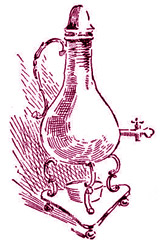The Tea Table
Tho' all unknown to Greek and Roman song,
The paler hyson and the dark souchong,
Tho' black nor green the warbled praises share
Of knightly troubadour or gay trouvère,
Yet deem not thou, an alien quite to numbers,
That friend to prattle and that foe to slumbers,
Which Kian-Long, imperial poet, praised
So high that, cent per cent, its price was raised;
Which Pope himself would sometimes condescend
To place commodious at a couplet's end;
Which the sweet Bard of Olney did not spurn,
Who loved the music of the "hissing urn."
...
For the dear comforts of domestic tea
Are sung too well to stand in need of me
By Cowper and the Bard of Rimini;
Besides, I hold it as a special grace
When such a theme is old and commonplace.
The cheering lustre of the new-stirr'd fire,
The mother's summons to the dozing sire,
The whispers audible that oft intrude
On the forced silence of the younger brood,
The seniors' converse, seldom over new,
Where quiet dwells and strange events are few,
The blooming daughter's ever-ready smile,
So full of meaning and so void of guile.
And all the little mighty things that cheer
The closing day from quiet year to year,
I leave to those whom benignant fate
Or merit destines to the wedded state.
...
'Tis woman still that makes or mars the man.
And so it is, the creature can beguile
The fairest faces of the readiest smile.
The third who comes the hyson to inhale,
If not a man, at least appears a male.
...
Last of the rout, and dogg'd with public cares,
The politician stumbles up the stairs;
Whose dusky soul nor beauty can illume,
Nor wine dispel his patriotic gloom.
In restless ire from guest to guest he goes,
And names us all among our country's foes;
Swears 'tis a shame that we should drink our tea,
'Till wrongs are righted and the nation free,
That priests and poets are a venal race,
Who preach for patronage and rhyme for place;
Declares that boys and girls should not be cooing.
When England's hope is bankruptcy and ruin;
That wiser 'twere the coming wrath to fly,
And that old women should make haste to die.
Condensed from a poem published in Fraser's Magazine,
January, 1857, and ascribed to Hartley Coleridge.

Education
Discover where the capital of the United States has been located...In Memory of Myron Angus - One Truly Amazing Man
Many people found inspiration through Myron Angus, a talented handicapped artist of international fame, who created all his works through painting with his mouth. He has mastered that fascinating technique of painting with the brush held between his teeth, and had ability to talk and paint at the same time. A simple dowel-rod with a rubber tip held between his teeth and his determination made it all possible. This other way of doing things didn't just happen over night.
When Myron was about 7 years old, his parents were visiting the C.N.E. in Toronto, Ontario. There, they came across a man by the name of Bill Watson (Canadian author and journalist William Ritchie Watson) at one of the displays. He was autographing the book "My Desire" which he had written by holding a pen in his mouth, he had no arms. When Mr. and Mrs. Angus told him about their son, he autographed a copy of the book special for Myron. Then he told them to put a pencil between his teeth. Let him learn to control the pencil this way, then put him in school.

